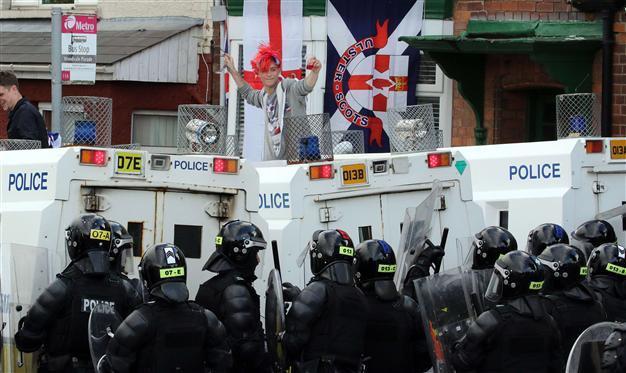Northern Irish police attacked at parade, 24 injured
BELFAST - Reuters

Loyalist supporters confront police at Woodvale Road, after their parade was banned from marching past the Nationalist Ardoyne shops in north Belfast, Northern Ireland on July 13, 2015. AFP Photo
Rioting erupted in Belfast during the annual Orange Order parade as police tried to block Protestant marchers from passing a Catholic housing estate, a return of the sectarian violence that has marred the traditionally emotive event in the past.Demonstrators pelted police with bottles, beer cans and other missiles on Monday night, injuring 24 police officers, Northern Ireland police said.
Riot police fired water cannon and plastic bullets. A crowd of Catholics stood hundreds of metres away, separated from the rioters by the police cordon.
Thousands of pro-British Protestants hold marches every July in the British-ruled province to mark a 1690 victory by King William of Orange that sealed Protestant domination, a tradition Catholic Irish nationalists consider provocative.
During the years of the Northern Ireland conflict, clashes invariably broke out during the parade. It ended without violence for the first time in decades last year, when marchers turned around before passing the Catholic Ardoyne area of Belfast.
The trouble started this year when Protestant loyalists reacted angrily to police forming a cordon to stop them passing a Catholic estate.
In Londonderry, windows were smashed in a bus carrying Orangemen home from a rally when it was pelted by stones.
Politicians from both sides of the Northern Ireland divide criticised the attacks.
"Those responsible do nothing to further the cause they claim to promote. They damage Northern Ireland and wreck a day which should be about respectful celebration of cultural tradition," Northern Ireland Secretary of State Theresa Villiers said.
The Grand Orange Lodge of Ireland, which organises the marches, said in a statement that it condemned those taking part in violence and that their actions only strengthened the hand of those who wish to further curtail the parades.
Three decades of fighting between mostly Protestant loyalists who want Northern Ireland to remain part of the United Kingdom and Irish nationalists, mainly Catholics, who want it to be part of a united Ireland, led to the deaths of over 3,000 people before a 1998 peace agreement.
Violence has subsided but the annual parades often revive tensions and some of the worst rioting in Northern Ireland in years took place two-and-half years ago after a decision to limit the number of days the British flag flies in Belfast.
















